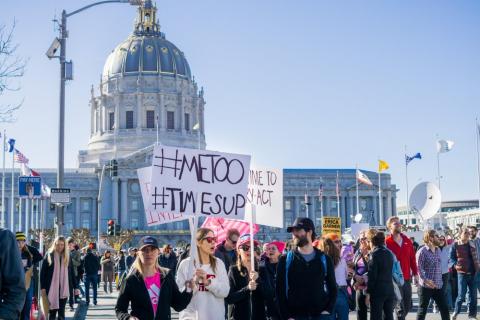Since the Me Too movement began shedding light on discrimination and sexual harassment within the workplace, companies around the U.S. have taken notice and are cracking down on lewd behavior.
Women across the country are speaking out against their assaulters and refusing to keep quiet. This has forced companies to re-evaluate their employees and enforce new regulations on how workers should act. Because of this, organizations are starting to improve their company culture and make the workplace a safer and happier place for women.
Companies Are Stepping It Up
According to research from Ohio University, women make up over half (50.8 percent) of the U.S. workforce, and of the 27.6 million firms in America, women own 9.8 million of them. Given these statistics, calls for equal pay and anti-discrimination laws toward women in the workplace have sprung up in recent years. The Me Too movement only amplified these pleas, making the concerns of female workers unignorable.
Companies such as KPMG, a tax and audit firm, are acting in a quick and responsive manner to claims of discrimination and sexual misconduct. In 2015, the company created a women’s leadership study and hired Lynne Doughtie as their CEO, the first female CEO of a big four accounting firm. Since then, KPMG implemented unconscious bias training for employees, diversity initiatives, and programs to ensure inclusion and opportunities for women. The company’s mission is a model for other companies to enforce as more and more women experience discomfort and trauma in the workplace.
Since the Me Too movement began, women have seen companies stand up in support of their courage and strength. According to a 2018 report conducted in June, over half of the companies surveyed have reviewed their sexual harassment policies, up from 34 percent in January. During an interview with Market Watch, one of the main conductors of the study, Andrew Challenger, said:
“Companies are responding to the cultural movement and recognizing that most of this abuse occurred in the workplace. Calls to make the office a safer place and free from any kind of abuse were overwhelming, and seeing companies respond is heartening.”
More Opportunities for Women
Since women began speaking out against their abusers throughout the Me Too movement, they’ve been greeted with both support and backlash. As some remain divided on the issue of coming forward with sexual assault allegations, companies are building a network of support for victims of sexual abuse to be heard and listened to.
Uber, the biggest ride-sharing company in the world, is now letting victims of sexual assault sue them in court, and is in the process of improving its reporting standards. This allows for customers who’ve faced harassment to be able to pursue legal action with the company’s permission.
More organizations are also being created to give women more professional opportunities in the workplace. Programs such as Girls Who Code are helping women grow in the computer science industry by introducing students to STEM skills early in life. Several companies have introduced programs designed to help women succeed professionally and personally, including GAP, Coca-Cola, and Salesforce.
Providing female workers with equal pay and increased parental leave are just a couple of the progressive ways that companies are helping women be more represented in the workplace.
Looking Forward
Even though companies are improving their standards and starting to confront the issue of sexual abuse more, there are still many more problems to address.
Diversity is something organizations are still struggling with. Even Congress is still overwhelmingly white and male. Women are still treated like outsiders in many factions of the workforce, but companies seem to be heading into the right direction, and the Me Too movement is to thank for that.
As educators begin to teach students about bigotry from an early age, corporations need to do the same. It’s impossible for companies to ignore the issue of workplace harassment in today’s political climate. Acknowledging the issue is the first step to fixing the problem and companies have proved themselves capable of doing so.
Reporting procedures are being put in place, sexual harassment training is being implemented, and company shake-ups are happening all thanks to the courage and resilience of women around the world sharing their stories of abuse.
But this problem won’t go away as long as women keep coming forward with sexual harassment allegations. It’s up to companies to not silence survivors of assault and let them report their abusers. With the right procedures in place, men won’t think to do or say anything derogatory and women will feel much safer and happier in the workplace.
Photo Credit: Sundry Photography / shutterstock.com
